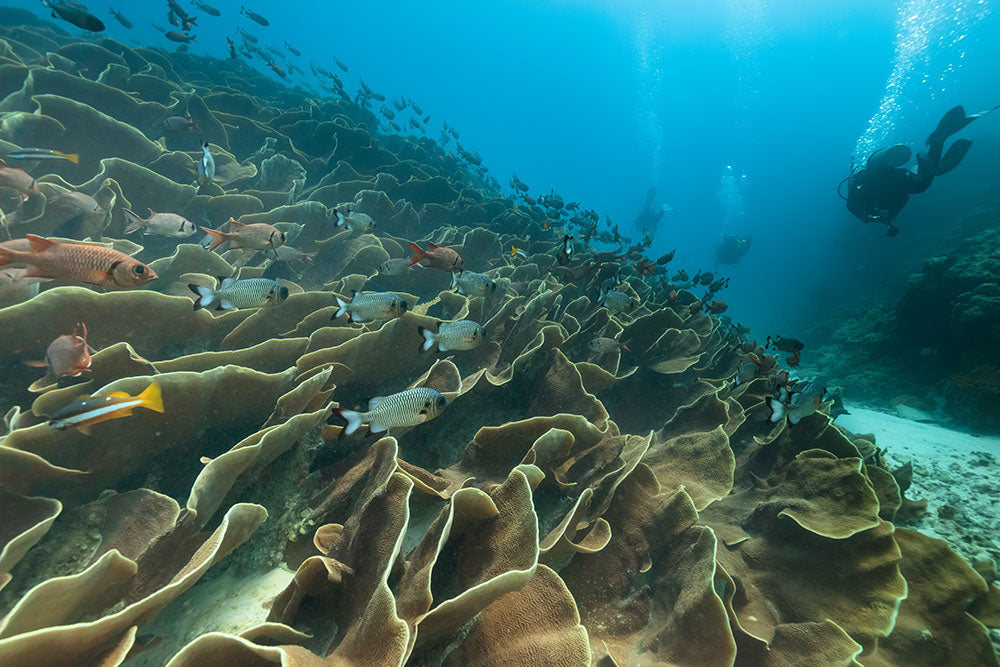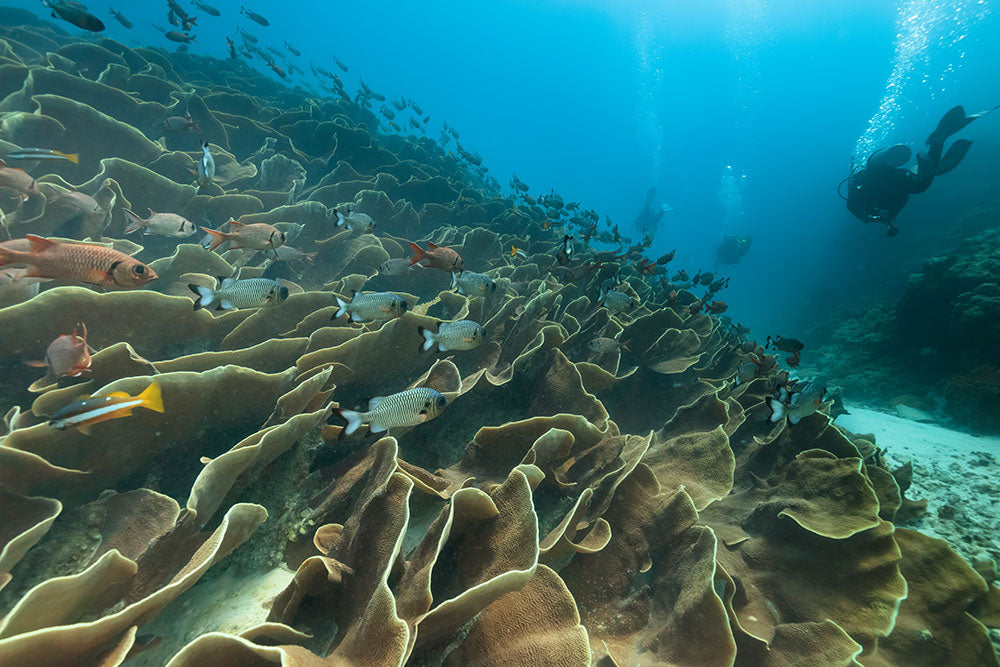The Demise of Reefs and The Efforts to Save Them


The vibrant colors, massive biodiversity, and endless medical and economic value of coral reefs may vanish much sooner than we imagined. According to a new study by The Intergovernmental Panel on Climate Change (IPCC), if carbon emissions are not reduced, we may be waving goodbye to these beautiful ecosystems by 2050. Coral is especially sensitive to rising sea temperatures and with the UN climate report predicting a 2-degree increase in temperature in 32 years, we will see a record high in coral bleaching.
Coral bleaching is the process of coral losing their symbiotic algal partners due to high ocean temperatures. The Great Barrier Reef has lost half of its coral reefs to bleaching and it is expected to continue to deteriorate. While coral reefs cover only 1 percent of the ocean floor, they hold 25% of the ocean’s biodiversity. This means an absence of these reefs is catastrophic to wildlife and to people who depend on them for a source of income. A massive 375 billion dollar industry surrounding reefs is collapsing at the same time, not to mention the countless medical studies that would be ended as a result of coral extinction.
Coral has chemical agencies to defend themselves that are beneficial to creating pharmaceuticals that battle cancer, Alzheimer’s, viruses, and many other diseases that are detrimental to humans. Unfortunately, scientists have only taken the first steps to research these medical benefits, leaving an abundance of additional discoveries that will never be discovered.
Currently, there are some big efforts being taken by scientists to find ways to prevent this catastrophe from occurring within our lifetime through a series of experiments aimed at activating genes to create climate change resistant coral. By examining certain mutations found in “super coral” that exempt them from feeling the full effects of global warming, scientists are working to find genetic indicators to activate this gene in developing coral populations. In essence, by genetically modifying the coral's agal partners, the coral should theoretically be able to resist the heating up and acidification of the ocean. However, there are disputes over whether genetically modified coral should be implemented into reefs because this would inevitably give these habitats a corporate biotech owner.
Additionally, there have also been coral farming efforts put in place in order to replace and add to dying coral populations. Underwater coral farms have proven successful, but they are difficult to manage considering divers must spend hours underwater. In the Bahamas, scientists have created the first land-based coral farm to increase production, and allow for more intensive research.
Governments in coastal regions such as the state legislature in Hawaii and most recently, the Republic of Palau, have banned up to ten reef harming chemical active ingredients found in sunscreens such as oxybenzone and octinoxate. A majority of public parks and resorts on the Yucatan Peninsula in Mexico have also banned the chemicals in 2018. Many other Caribbean countries are looking to follow Hawaii and Palau’s lead and ban these ingredients as well.
The Great Barrier Reef recovered from a calamitous bleaching event in 1998 following a relentless El Niño storm season that affected 90% of all the coral and killed over one-third of the coral. Since then, parts of the reef were able to recover due to a period of time where the bleaching process slowed and the reefs experienced excellent fertility. Now, however, efforts to reverse bleaching by scientist seem hard pressed as global warming is now too extensive and ubiquitous to allow for such recovery.
These efforts are promising, but appear to be too little, too late. Climate change caused by human activity has been ignored for over a century, and these beautiful ocean ecosystems may be the first unfortunate casualty of unsustainable human living on this planet.
Written by Drako Alva
Works Cited
Adams, Jake, et al. “When Coral Farms Become Coral Reefs Featured, News Reef Builders | The Reef and Marine Aquarium Blog.” Reef Builders | The Reef and Marine Aquarium Blog, 8 Mar. 2018, reefbuilders.com/2018/03/06/when-coral-farms-become-coral-reefs/.
“Coral Reef Restoration | Mote Field Stations.” Dr. Eugenie Clark | Staff Members | Mote, mote.org/research/program/coral-reef-restoration.
Gabbatiss Science Correspondent @josh_gabbatiss, Josh. “Scientists Have Genetically Engineered Coral to Save Reefs from Climate Change.” The Independent, Independent Digital News and Media, 24 Apr. 2018, www.independent.co.uk/environment/coral-reef-genetically-engineered-climate-change-great-barrier-global-warming-a8318756.html.
Guest, James, et al. “3D Printing Coral Reefs Can Create New Habitat – but It Doesn't Tackle Human Destruction.” The Conversation, The Conversation, 9 Oct. 2018, theconversation.com/3d-printing-coral-reefs-can-create-new-habitat-but-it-doesnt-tackle-human-destruction-103927.
Langenheim, Johnny. “AI Identifies Heat-Resistant Coral Reefs in Indonesia.” The Guardian, Guardian News and Media, 13 Aug. 2018, www.theguardian.com/environment/the-coral-triangle/2018/aug/13/ai-identifies-heat-resistant-coral-reefs-in-indonesia.
“‘Trouble in Paradise’: Why Death of World's Coral Is Alarming.” NBCNews.com, NBCUniversal News Group, 21 Apr. 2018, www.nbcnews.com/news/world/scope-great-barrier-reef-s-massive-coral-bleaching-alarms-scientists-n867521.
AR4 WGI Glossary - Glossary E-O, IPCC, www.ipcc.ch/news_and_events/pr_181008_P48_spm.shtml.
Becatoros, Elena. “More than 90 Percent of Coral Reefs Will Die out by 2050.” The Independent, Independent Digital News and Media, 13 Mar. 2017, www.independent.co.uk/environment/environment-90-percent-coral-reefs-die-2050-climate-change-bleaching-pollution-a7626911.html.
Berkelmans, Ray, et al. “A Comparison of the 1998 and 2002 Coral Bleaching Events on the Great Barrier Reef: Spatial Correlation, Patterns, and Predictions.” SpringerLink, Springer, 10 Jan. 2004, link.springer.com/article/10.1007/s00338-003-0353-y.
Bruckner, Andrew W. “Life-Saving Products from Coral Reefs.” Issues in Science and Technology, 15 May 2015, issues.org/p_bruckner/.
Cao, Sissi. “Here's How Hawaii's Sunscreen Ban Will Affect Your Favorite Brands.” Observer, Observer, 3 July 2018, observer.com/2018/07/hawaii-sunscreen-ban-affect-favorite-brands/.
Moulite, Maritza. “Is Your Sunscreen Killing Coral Reefs?” CNN, Cable News Network, 9 July 2018, www.cnn.com/2018/07/09/health/hawaii-sunscreen-ban-questions/index.html.
Worland, Justin. “Dying Coral Reefs Impact Environment and Economy.” Time, Time, time.com/coral/.
Xu, Vicky Xiuzhong. “Palau Bans Many Kinds of Sunscreen, Citing Threat to Coral.” The New York Times, The New York Times, 2 Nov. 2018, www.nytimes.com/2018/11/02/world/asia/palau-sunscreen-ban-coral.html.


